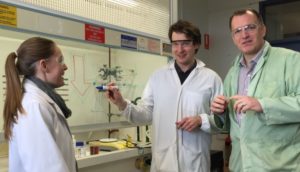
Flinders Centre for NanoScale Science and Technology PhD candidates Jakob Andersson and Melanie Fuller have won Australian Institute of Nuclear Science and Engineering (AINSE) top-up research scholarships.
The scholarships will help progress their respective postgraduate projects – on model membrane systems for possible development of new drugs such as antibiotics, and using nanoparticles to improve cystic fibrosis treatment. They will gain more access to AINSE facilities and benefit from additional PhD supervision.
“The main focus of my work is to develop novel model systems for the cellular membrane that can be used in drug development as well as providing platforms for highly sensitive biosensors,” says Jakob, who received the AINSE postgrad award in 2015 and who was invited to speak at the 2016 AINSE Roadshow. Jakob was also a Faculty of Science and Engineering finalist in the University’s Three-Minute Thesis competition last year.
Melanie Fuller, who received the AINSE scholarship this year, recently won best honours talk at the Australian Society for Medical Research South Australia Conference. In her PhD, she is looking into using nanotechnology to improve the treatment of cystic fibrosis. She had started this project during her Honours thesis and had won a place in the finals of last year’s Winnovation Awards.
Access to the high-tech AINSE facilities will help her to better characterise the virus nanoparticles she is studying while Jakob’s research uses neutron scattering techniques to look at the structure of the model membrane systems he is building in very fine detail.
Their Flinders supervisor, senior lecturer Dr Ingo Köper, said the pair’s efforts were a credit to the Flinders Centre for NanoScale Science and Technology and to the School of Chemical and Physical Sciences.
“Their postgraduate studies have real-world applications and the AINSE support program will progress insights into their areas of nanotechnology,” Dr Köper says.
AINSE is a not-for-profit consortium of 39 universities, plus the Institute of Geological and Nuclear Science, in partnership with the Australian Nuclear Science and Technology Organisation (ANSTO).
It provides a mechanism for access to the special facilities at ANSTO and other national facilities and a focus for cooperation in the nuclear scientific and engineering fields.

